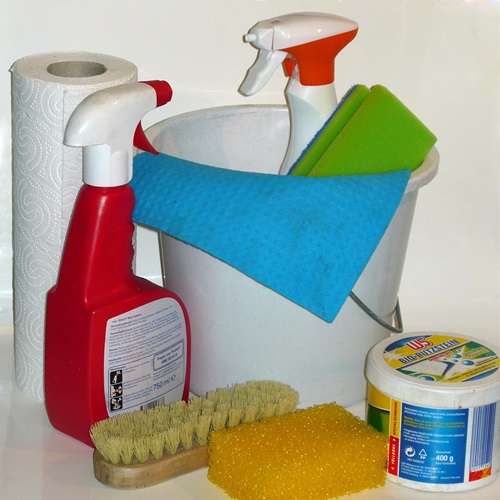Do you own these common household products?
As omnivores and natural scavengers, a dog’s curiosity can get them into trouble as some common household items are poisonous to dogs and could be fatal if ingested. Here is a list of some of the items found in homes that you need to keep away from your dog.
Antifreeze
Antifreeze is very poisonous to dogs and especially small puppies. Antifreeze contains ethylene glycol, a chemical that can cause severe kidney damage and failure if ingested by dogs. Even small amounts of antifreeze can be fatal to your pup. Antifreeze poisoning can cause symptoms such as lethargy, lack of coordination, vomiting, increased thirst and urination, and seizures. If you suspect that your dog has ingested antifreeze, you should take your dog to the nearest veterinarian immediately, as treatment is most effective within 8 to 12 hours of exposure. To prevent antifreeze poisoning, you should keep antifreeze containers out of your dog’s reach, clean up any spills or leaks, and use antifreeze products that contain propylene glycol instead of ethylene glycol, as propylene glycol is less toxic to dogs.
Bleach
Bleach contains sodium hypochlorite, a chemical that can cause burns and damage to the mouth, throat, stomach, and kidneys of your dog if swallowed. Bleach can also irritate the eyes, skin, and respiratory tract of dogs if inhaled. Bleach poisoning can cause symptoms such as drooling, vomiting, diarrhea, coughing, weakness, tremors, seizures, and coma. To prevent bleach poisoning, you should store bleach products in a secure place, away from your dog, and clean up any spills or leaks promptly. You should also avoid using bleach products around your dog or in areas where your dog may lick or sniff. Bleach poisoning should be considered a medical emergency and requires immediate veterinary attention.
Tylenol
Tylenol or acetaminophen, is extremely poisonous to dogs. Dogs cannot metabolize acetaminophen as well as humans, and even a small dose can be toxic. This is especially true if you have a small dog or puppy. Tylenol poisoning can cause liver damage, reduced oxygen-carrying capacity of the blood, and even death in dogs. It can cause symptoms such as vomiting, drooling, weakness, panting, abdominal pain, and seizures. If you think your dog has ingested Tylenol, you should take your dog to the vet immediately, as early treatment is crucial for survival. To prevent acetaminophen poisoning, you should keep it and other medications out of your dog’s reach, and never give acetaminophen to your dog without consulting your vet
Batteries
Alkaline batteries and especially lithium batteries are very dangerous to dogs. Batteries contain chemicals that can cause burns, internal damage, or even death to dogs if they are chewed, punctured, or swallowed. Batteries can also get stuck in the dog’s mouth, throat, stomach, or intestines causing blockages or perforation which may require surgery. Some batteries, such as lithium batteries, are more toxic than others and can cause severe harm within minutes of being chewed or swallowed. If your dog has been exposed to a battery, you should take them to the vet immediately, early treatment is crucial for survival. You should also prevent your dog from getting access to batteries by storing them in a secure place, cleaning up any spills or leaks, and avoiding keeping battery-powered products within reach your dog or puppy.
Moth Balls
Moth balls contain chemicals such as naphthalene, paradichlorobenzene, or camphor, which can cause serious harm to dogs if they are chewed, or swallowed. Moth ball poisoning can cause symptoms such as vomiting, diarrhea, weakness, tremors, seizures, and organ damage. If you suspect your dog has consumed moth balls, do NOT induce vomiting, you should consider it a medical emergency that requires immediate veterinary attention. To prevent moth ball poisoning, you should store moth balls in a secure place, away from your dog’s reach, and avoid using them around your dog or in areas where your dog may lick or sniff.
Laundry Detergent and Fabric Softeners
Laundry detergent and fabric softener are both poisonous to dogs. They contain chemicals which can cause severe illness or even death to dogs if they are chewed, or swallowed. Laundry detergent and fabric softener poisoning can cause symptoms such as vomiting, diarrhea, weakness, tremors, seizures, and organ damage. To prevent poisoning, you should store these products in a secure place, away from your dog, and avoid using them in areas where your dog may lick or sniff. You should NOT induce vomiting if your dog has ingested laundry detergent or fabric softener, as this can worsen the injury and increase the risk of aspiration pneumonia. If you think your dog has ingested laundry detergent or fabric softener, contact your veterinarian immediately.
Mouthwash
Mouthwash products are design for human use and not for dogs. They contain chemicals that can cause burns, intestinal or stomach damage, and even death to dogs if they are swallowed. Mouthwash poisoning can cause symptoms such as vomiting, diarrhea, weakness, tremors, seizures, and organ damage. To prevent mouthwash poisoning, you should store mouthwash products away from places that your dog can access, and avoid using it in areas where your dog may lick or sniff. You should NOT induce vomiting if your dog has swallowed mouthwash, as this can worsen the injury and increase the risk of additional medical problems. If you think your dog has swallowed mouthwash, contact your veterinarian immediately.
This is just a partial list of common household items that could be poisonous to dogs and puppies. If you think your dog may have eaten something dangerous, contact your veterinarian immediately or take your dog to the closest emergency clinic.




